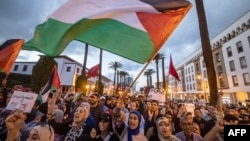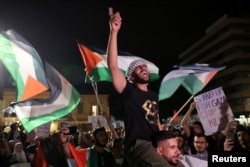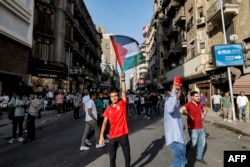Tens of thousands of people in Muslim countries held demonstrations in support of Palestinians in the Gaza Strip on Friday, calling on Israel to stop its airstrikes on the territory in response to an attack by Hamas militants.
Protesters gathered in Arab nations and beyond, including Egypt, Lebanon, Turkey, Iraq, Jordan, Yemen, Morocco, Malaysia and Indonesia.
In Egypt, where the military usually bans public gatherings, thousands took to the streets of Cairo and other cities in a public outpouring of anger.
Demonstrators chanted, "The people want the fall of Israel," modifying a common chant from the Arab Spring: "The people want the fall of the regime."
In Bahrain, which has normalized relations with Israel, several thousand people marched, chanting slogans such as, "No to normalization!"
The protests came two weeks after Israel began its campaign in Gaza in response to a surprise Hamas attack on October 7 that killed at least 1,400 people, most of them civilians.
The Hamas-run health ministry said the ongoing Israeli attacks have killed more than 4,100 Palestinians.
Many Western governments have voiced support for Israel's military campaign, while most Muslim states have called for an immediate cease-fire.
President Joe Biden has said the U.S. will provide unwavering support for Israel in its military response to the Hamas attack and pledged during a brief visit to Tel Aviv this week that the United States would ensure Israel's qualitative military edge as it has done for decades.
In a prime-time speech Thursday night, Biden urged Congress to pass more than $100 billion in aid for Israel, Ukraine and Taiwan.
He said it was a matter of national security for the U.S. to stand up to Hamas and Russian President Vladimir Putin, each of whom is trying to "annihilate a neighboring democracy."
Palestinians in the West Bank city of Ramallah expressed frustration toward Biden and his administration's support for Israel.
Hanin, a 29-year-old journalist who asked that his last name not be used, told VOA that Biden is "not even neutral about the war."
"He can end everything with easy steps, but he … doesn't want peace. … [Biden] and [Israeli Prime Minister Benjamin] Netanyahu are the head of everything that's happening here. They are responsible for everything happening here."
Hamza, 20, who also did not want his last name used, said he believed Biden's words showed that the president thinks Palestinians are terrorists.
"We are not terrorists. They are trying to distort the attack. All we are trying to do is to get our liberation from the occupation soldiers," he told VOA.
Protests broke out in the main cities of the occupied West Bank on Friday following midday prayers. Protesters threw stones at Israeli troops and burned tires, while Israeli security forces responded by firing tear gas and live rounds.
The mounting anger in Muslim countries is also being expressed by its leaders.
On Friday, Turkish President Recep Tayyip Erdogan said Israel's attacks on Gaza amounted to genocide.
"I repeat my call for the Israeli leadership to never expand the scope of its attacks on civilians and to immediately end its operations amounting to genocide," Erdogan said on X, formerly known as Twitter.
Following the Hamas attack on Israel, Turkey initially condemned the civilian deaths in Israel and called for restraint.
But as the humanitarian crisis in Gaza has intensified, Ankara, which has diplomatic relations with Israel, has toughened its stance.
Erdogan spoke to Egyptian President Abdel Fattah el-Sissi by phone on Friday and said, "The savagery toward Palestinian lands was deepening," according to his office.
'Accumulated fury'
Earlier this week, el-Sissi told visiting U.S. Secretary of State Antony Blinken that while Egypt "unequivocally condemns" the Hamas attacks on Israeli, the militants were motivated by the dire conditions Palestinians face.
"We need to understand that this is the result of accumulated fury and hatred over four decades, where the Palestinians had no hope to find a solution," he said.
Egypt is holding a summit on the Gaza crisis on Saturday amid growing fears of a wider war in the Middle East. The Cairo Peace Summit will bring together officials from Arab and European countries, but the fact that the U.S. and Israel will not send top officials has dampened expectations.
Jordan's foreign minister said on Thursday that his country feared the worst was yet to come and said the war would have "catastrophic repercussions."
In Jordan's capital, Amman, several thousand protesters marched in the center of the city while thousands more rallied near the Israeli Embassy to show their support for Palestinians.
Yan Boechat, reporting for VOA from Ramallah, contributed to this report. Some information came from The Associated Press, Reuters and Agence France-Presse.







